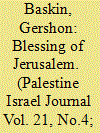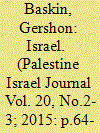| Srl | Item |
| 1 |
ID:
149804


|
|
|
|
|
| Summary/Abstract |
The status of Jerusalem is the biggest challenge in the Israeli-Palestinian conflict. It is in Jerusalem where we will determine whether peace can be a reality.
|
|
|
|
|
|
|
|
|
|
|
|
|
|
|
|
| 2 |
ID:
138326


|
|
|
|
|
| Summary/Abstract |
Israel views itself as the nation-state of the Jewish people, and Prime Minister Binyamin Netanyahu demands that the Palestinians recognize Israel as such as a prerequisite to what he claims would be genuine negotiations on a two-state solution. The proposals to partition Palestine/Eretz Yisrael into two states for two peoples date as far back as 1937 to the Peel Commission, and were based on the assertion that the Israeli-Palestinian conflict is an identity-territorial conflict between two national movements over the territorial expression of their separate identities.
|
|
|
|
|
|
|
|
|
|
|
|
|
|
|
|
| 3 |
ID:
190254


|
|
|
|
|
| Summary/Abstract |
We (Israel and Palestine) have been in political deadlock at least since the end of the Olmert-Abbas negotiations in 2008-2009. No real negotiations have taken place since then, and of course, no progress has been made toward resolving the Israeli-Palestinian conflict. During those long years, Israel continued to build settlements and widen its military occupation. Israel’s occupation infrastructure — physical and bureaucratic — makes it difficult to imagine that partition of the land between the Jordan River and the Mediterranean Sea into two states for two peoples is even possible. Additionally, with years of no contact, especially between young Palestinians and Israelis, there appears to no longer be a majority on either side of the conflict in support of the Olso paradigm of a two-state solution. Public opinion could change if there emerged leaders who were genuinely committed to the two-state solution, but they do not appear to exist at this time. Even if there is no longer a viable two-state solution, however, eventually Israelis and Palestinians will have to return to the table to determine how we are going to live together on this land – one state, two states, three states, 10 states, federation, confederation, or perhaps some sort of hybrid model. Until then, and in order to reach that reality, there are many things that Israelis, Palestinians, Israelis and Palestinians together, and international actors could do to push us forward toward a better future. The following are some suggestions regarding what can be done.
|
|
|
|
|
|
|
|
|
|
|
|
|
|
|
|